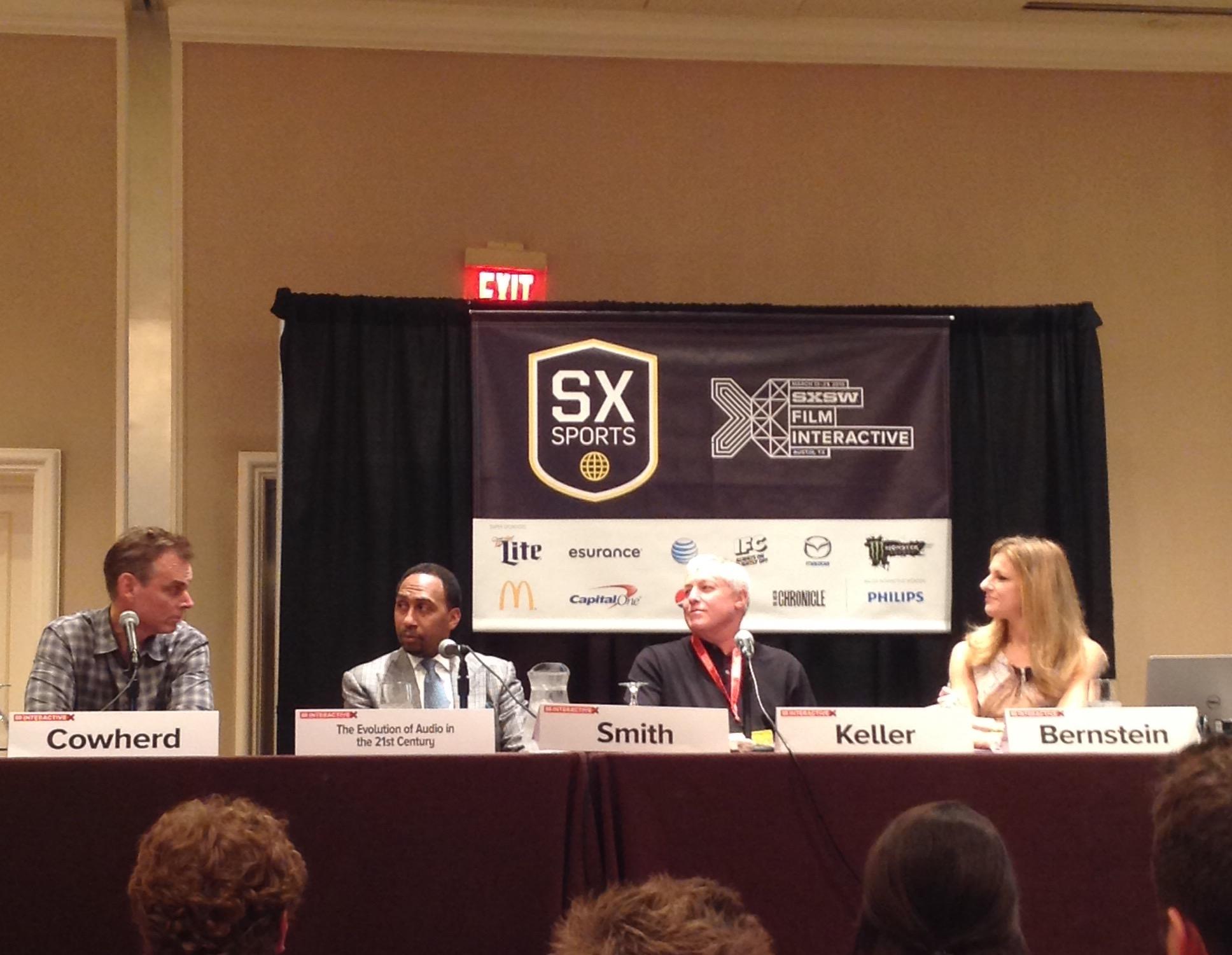By Rahul Naik
“The Evolution of Audio in the 21st Century” was an all-star panel at SXSWSports. It included a couple of sports hosts and broadcasters that I’ve grown up watching and listening to: Colin Cowherd and Stephen A. Smith.
It was almost surreal getting glances from Stephen A. Smith as he surveyed the crowd, knowing that he would be on ESPN First Take the next morning debating Skip Bayless with his outspoken personality and distinguishable vocabulary.
I felt the same about meeting Colin Cowherd after the panel. Cowherd is a radio host that I had grown up listening to. When I was without cable and in need of my sports news fix, he was one of the people I could turn to. Cowherd has a way with tying anecdotes into his sometimes outrageous sports opinions. Still his words have an ebb and flow that makes it easy to follow.
There were many valuable takeaways from the panel, especially for the aspiring broadcasters in the audience. In an attempt to recreate the experience, I present you with the top five lessons from the panel, straight from the mouths of the incredible broadcasters themselves:
1. Radio broadcasting provides more freedom and autonomy than television broadcast does. It can also reach a wider audience.
Smith: “I can take my time on radio, and things can’t be misconstrued.”
Cowherd: “It’s more story-telling and more personal. I consider radio a performance art. I don’t consider myself a journalist, but it’s a little bit of stand-up, it’s a little bit of Carson and a little bit of journalism.”
Smith: “On my show, the only time I allow people to talk is when I ask them to.”
2. Own your style as a broadcaster, be unique and don’t be afraid to stand up for your opinions and ideals. But, don’t be so stubborn that you are closed to other views or are unable to accept criticism.
Smith: “I’m in your face. I come at you like a mad truck, just trying to tell you how I believe it is.”
Cowherd: “I try to be hysterical or absurd. I try to create magic.”
Smith: “You need to have the approach that this is how I see it, and I’m not scared. Be open to changing your views but don’t hedge your bets.”
Cowherd: “I’m a better broadcaster because of my critics because a lot of the time I’m wrong…I criticize for a living, so it would be unfair for me to be sensitive to it.”
Smith: “I’m black. I’m unconventional. There aren’t a lot of blacks in sports TV or radio. So I’ll have a different perspective from a lot of people.”
3. Sports talk needs women.
Cowherd: “Women bring a completely different perspective to sports, and it’s fascinating.”
Smith: “A lot of women call my show and I love that. When you listen to their calls, it’s enlightening. They don’t just talk about sports. I like people that bring life into sports.”
Cowherd: “Women’s calls to radio elevate the discourse. They’re just more interesting.”
4. Podcasting is part of the future of broadcast. It gives the audience the agency to choose exactly what material they want and it provides the opportunities for amateurs to launch a career or take a chance.
Cowherd: “Podcasting is great. The power is in the audience. I can take more chances [on a podcast]. When I do a show now, I take risks. I believe podcasting was created for moments.”
Cowherd: “Podcasting takes away all limitations. It empowers the audience and gives you all the smartest content.”
5. It can sometimes be difficult to work for ESPN, because ESPN is Mickey Mouse.
Smith “ESPN must be represented as Mickey Mouse… as a happy place. That is a challenge.”
Cowherd: “Maybe for you.”
Smith: “It is idiotic for you, if you work at ESPN, not to think of Mickey Mouse, because you’ll be introduced to him real fast.”
After the panel, Stephen A. Smith took a couple of photos and rushed out of the venue, presumably to meet up for dinner with Kobe in LA. I did get the chance to meet Colin Cowherd, and we discussed some of his advice on broadcasting. “Be original,” he said. “Be funny, be a good communicator. But don’t forget to be yourself.”







































